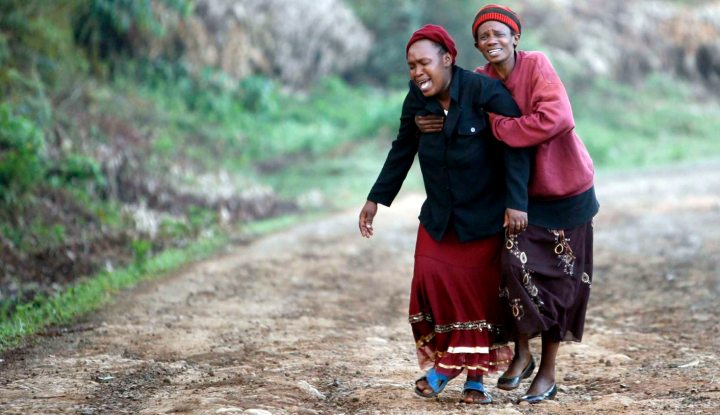Africa
Retribution For Hire: Ruthless Kenyan gang resurfaces ahead of crucial polls

The resurgence of the mysterious Mungiki gang just ahead of new Kenyan polls raises difficult questions for Kenya's politicians. The banned organisation played a crucial role in instigating the 2007/2008 post-election violence, and Kenyans fear their malign influence may cause trouble again. By NJERI KIMANI.
Its origins are shrouded in mystery. Was it a resistance movement, created to topple the government of Daniel Arap Moi? Was it a hardline religious sect that worshipped through violence instead of prayer? Or was it simply a well-organised criminal outfit with a penchant for gory symbolism – and retribution?
The answer is none of those things. And all of them.
Decades after its establishment, the Mungiki – call it a sect, call it gang, call it what you will – continues to defy easy labels. And years after many members were wiped out in a series of bloody battles with police, the Mungiki are back.
One thing is for sure: the Mungiki have always been troublemakers. As Vice explained in a 2012 report: “Gangsters in Nairobi generally make their living from exploiting illegal electricity hookups, extorting shop owners and taxi-bus drivers, robbery, and murdering people who cross them. But members of the Mungiki take things to another level. They’re shifty, often hypocritical, and occasionally psychotic, even by the standards of their fellow criminals. When there’s a riot that needs inciting, voters who require intimidation, or crimes against humanity to commit, they are the go-to guys, backing up their reputation with a track record of government manipulation, drinking blood, and beheading their enemies.”
The sect was implicated in Kenya’s infamous post-election violence in 2007/2008; in charges since dropped, now-President Uhuru Kenyatta was accused of funding, arming and mobilising the Mungiki to commit violence against political opponents. Since then, the sect has flown under the radar, licking its wounds and regrouping.
And now, in the run-up to another controversial election, it seems the Mungiki are ready to influence the outcome again, with Kenyan authorities ill-prepared to deal with their resurgence in towns and cities all over the country.
In a statement in late February, Kenya’s Inspector-General of National Police Service Joseph K Boinett raised concern over the resurgence of the group.
“We have noted that there are some individuals making efforts to resuscitate these groups as we approach the electioneering period. We therefore warn that any moves by such groups or their agents will be met by the full force of the law and will not be allowed to thrive. Police in conjunction with the national administration are determined to root out their illicit activities. To this end, any public officer found complicit with these individuals will be dealt with in accordance with the law,” said Boinett.
Prominent politicians have been courting controversy by associating with Mungiki leaders, amid fears that politicians are inciting a new wave of Mungiki harrassment. In January, Nakuru County Governor Kinuthia Mbugua caused a stir when he attended the burial of one Joseph Chege, a notorious Mungiki leader. Chege’s body was discovered dumped at Karura forest. He had been missing for a week. The governor’s presence at his funeral was seen as an indirect endorsement of the sect’s operations.
In an interview, Nakuru Street Traders and Hawkers Association Chairman Simon ole Nasieku said the Mungiki were “a ruthless gang which destroyed their kiosks during an eviction of hawkers.
“How he [Governor Kinuthia] chose to attend and associate with a banned sect leaves a lot to be desired. But it’s now clear that he has been protecting them,” said ole Nasieku.
The governor denied wrongdoing, saying he and Chege had been doing business together for a long time.
This did little to calm fears from locals that these groups and other gangs could be used in the 2017 elections to campaign for him and other powerful politicians in the country.
“The group is mainly very active before general elections and is approached by very powerful politicians. Kinuthia might just have been the first in many who will seek to engage with them,” said a Kiambu resident who blamed the sect for illegal land dealings in Muranga and Naivasha.
In Embu, residents want the government to investigate the close links of the gang with prominent politicians.
“They are in full control of the matatu bus terminus and they cannot allow us to operate freely. They end up asking for hefty bribes and in some cases even end up torching matatus (minibus taxis) which do not comply with them,” said John Mugambi.
Peter Muchiri from Muranga called for an immediate crackdown on all the members of the gang in the country.
“The only way to tame them is to ensure that they are prosecuted before the court of law,” said Muchiri. DM
Njeri Kimani is a journalist based in Nakuru, Kenya.
Photo:Two residents of Gathaithi Village mourn the killing of their relatives in Nyeri East district by members of the Mungiki group on 21 April 2009. Police sources say 27 villagers were hacked to death in the night raid by the banned sect known as Mungiki. EPA/GEORGE MULALA.


















 Become an Insider
Become an Insider